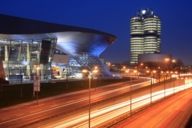
As a leading university and science location, the state capital of Munich offers an ideal environment for congresses, conferences and events. Numerous business clusters and the thriving environment make the city an attractive choice for experts from all over the world, inspire creative exchange and attract start-ups. Munich is well known for its success in the three sectors of vehicle manufacturing, IT and information technology, and financial services.
The metropolis of Munich is home to relevant international groups in the automotive industry, such as the BMW Group and the commercial vehicle manufacturer MAN/Volkswagen Group. In addition, there are suppliers and other service providers such as Krauss-Maffei, Knorr-Bremse, iwis-Ketten, Webasto and Meiller. More than 50,000 employees are directly involved in vehicle construction in Munich. Thus, the industry is one of the largest employers in the region.
In 2021, the IAA was held in Munich for the first time with a novel concept. Innovative mobility solutions were presented in a hybrid format to a trade audience at the Messe München exhibition center and online, but also to the general public on central squares in the city. At the "Open Space", Munich's most beautiful squares became forums for exchanging ideas about mobility concepts of the future and stages for technologies that can be experienced.
Various prominent locations in the center of Munich, including Marienplatz and Odeonsplatz, became the venue for a city-wide dialog about visions, innovations, and sustainable mobility solutions for the future. A diverse program consisting of entertainment and information provided direct contact between consumers and manufacturers.
The highway between Messe München and the city center became a "Blue Lane" and thus a test track for sustainable technologies. Visitors were able to try out and "experience" new forms of mobility and low-emission drive technologies for themselves as part of a pilot project. In the sense of a multi-modal connecting route that can be experienced, the Blue Lane integrated car traffic and public transport.
Further information at: www.iaa.de
Munich is also home to the Digital Hub Mobility, where established companies collaborate with innovation partners from the startup scene and academia on the topic of mobility. Munich is also home to the InsurTech Hub. The non-profit innovation platform brings together international insurance and cross-industry partners, startups, investors, universities, and government agencies to make the industry fit for the future. Both are part of the Germany-wide Digital Hub Initiative of the German Federal Ministry of Economics and Climate Protection.
The state capital of Munich also takes the topic of electromobility very seriously. As dpa reported last year, Bavaria possesses almost 10,000 electric charging points. Therefore, it has the most in Germany. With 89 charging points per 100,000 inhabitants, Munich is the metropolis with the best range of public charging stations.
There is no German region with more companies in the IT, software, and communications industry than in Munich. These include Apple, Google, Microsoft, IBM, Cisco Systems, Cancom SE, Nemetschek SE, ATOSS Software, and Huawei Technologies, all of which have their headquarters or a branch office in Munich.
Around 1,300 start-ups in the IT and communications technology segment are recorded in the Munich region every year - that's nine percent of all start-ups in Germany. UnternehmerTUM start-up center at the Technical University of Munich supports start-ups from the very beginning and is considered the "No. 1 forge". Among the current TU Munich alumni is a "decacorn" - a start-up worth more than ten billion dollars: the software company Celonis. The founders received their first scholarship at UnternehmerTUM and worked on their business plan. Today, the company is the global market leader for intelligent process analysis.
A total of six Unicorns and decacorn, are located in the Munich area. Flixmobility, Lilium, and Personio, are TUM spin-offs or were funded by UnternehmerTUM and participated in its programs.
Munich is also a leading "Internet of Things" location. The Munich Institute of Robotics and Machine Intelligence MIRMI is one of the leading institutes for interdisciplinary research in artificial intelligence. In 2016, IBM opened the headquarters of its "Internet of Things" business unit in Munich.
UnternehmerTUM and the City of Munich have also jointly created a new innovation and start-up center for Smart City Solutions in the city - the MUNICH URBAN COLAB.
Munich Quantum Valley (MQV) is an initiative to promote quantum science and quantum technologies in Bavaria and is supported by the Bavarian state government. As a hub between research, industry, sponsors, and the public, it is intended, among other things, to help develop and operate competitive quantum computers in Bavaria.
Numerous companies from the banking, insurance, asset management, venture capital, leasing, and factoring sectors have their headquarters or a branch office in Munich. These include Allianz, Munich RE, Swiss RE, Deutsche Pfandbriefbank, Bayerische Landesbank, Stadtsparkasse München and Versicherungskammer Bayern. As an insurance location, Munich is Germany's No. 1, followed by Frankfurt in second place as a banking center. In the reinsurance sector, Munich even leads the world.
The technology-oriented start-up scene in the banking and insurance industries has also been successfully established in Munich. Hence, Bavaria's capital is one of Germany's leading FinTech locations. The international business law firm White & Case even ranked Munich fifth among global FinTech centers, after Silicon Valley, London, Singapore, and Hong Kong. Thanks to many information and communications technology companies in Munich, the FinTech and InsurTech scene can draw on a wealth of resources and also benefits from the many resident research institutions.